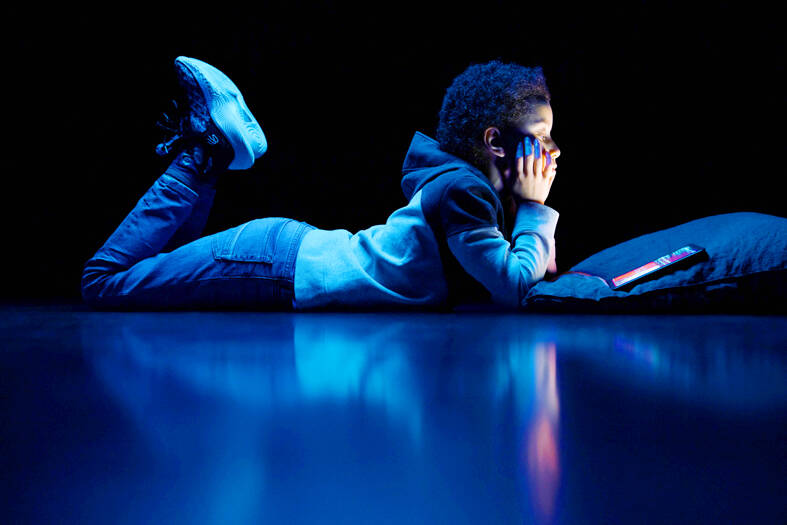About 16 percent of children aged 11 to 15 were cyberbullied in 2022, up from 13 percent four years ago, a WHO Europe report covering 44 countries said yesterday.
“This report is a wake-up call for all of us to address bullying and violence, whenever and wherever it happens,” WHO Regional Director for Europe Hans Kluge said in a statement.
Fifteen percent of boys and 16 percent of girls reported being cyberbullied at least once in the past few months, showed the Health Behaviour in School-aged Children study, titled A Focus on Adolescent Peer Violence and Bullying in Europe, Central Asia and Canada.

Photo: AFP
The UN agency said that the COVID-19 pandemic has changed the way adolescents behave toward each other.
“Virtual forms of peer violence have become particularly relevant since the onset of the COVID-19 pandemic, when young people’s worlds became increasingly virtual during times of lockdown,” the report said.
Other bullying has remained largely stable with just a slight increase.
Eleven percent of boys and girls reported being bullied at school at least two or three times a month in the past couple of months, compared with 10 percent four years ago.
The highest levels of cyberbullying were experienced by boys in Bulgaria, Lithuania, Moldova and Poland, while the lowest levels were reported in Spain, the WHO said, without providing detailed data.
“With young people spending up to six hours online every single day, even small changes in the rates of bullying and violence can have profound implications for the health and well-being of thousands,” Kluge said.
One adolescent in eight admitted cyberbullying others, an increase of three percentage points from 2018, the report said.
Meanwhile, the number of adolescents who engaged in physical fighting remained stable over the four-year period at 10 percent — 14 percent for boys and six percent for girls.
The study was based on data from 279,000 children and adolescents from 44 countries across Europe, Central Asia and Canada.
In most places, cyberbullying peaked when children were 11 years old for boys and 13 for girls.
Parents’ socioeconomic status made little difference in children’s behavior, the report found.
However, Canada was an exception, where less advantaged young people were more likely to experience bullying.
Twenty-seven percent of girls belonging to the 20 percent least affluent families in Canada said they had been subjected to bullying at school, compared with 21 percent of girls among the 20 percent most affluent families.
Noting that the problem was widespread, the report called for greater efforts to improve awareness.
“More investment in the monitoring of different forms of peer violence is needed,” it said.
“There is also an urgent need to educate young people, families and schools of the forms of cyberbullying and its implications, while regulating social media platforms to limit exposures to cyberbullying,” it said.

Former Nicaraguan president Violeta Chamorro, who brought peace to Nicaragua after years of war and was the first woman elected president in the Americas, died on Saturday at the age of 95, her family said. Chamorro, who ruled the poor Central American country from 1990 to 1997, “died in peace, surrounded by the affection and love of her children,” said a statement issued by her four children. As president, Chamorro ended a civil war that had raged for much of the 1980s as US-backed rebels known as the “Contras” fought the leftist Sandinista government. That conflict made Nicaragua one of

COMPETITION: The US and Russia make up about 90 percent of the world stockpile and are adding new versions, while China’s nuclear force is steadily rising, SIPRI said Most of the world’s nuclear-armed states continued to modernize their arsenals last year, setting the stage for a new nuclear arms race, the Stockholm International Peace Research Institute (SIPRI) said yesterday. Nuclear powers including the US and Russia — which account for about 90 percent of the world’s stockpile — had spent time last year “upgrading existing weapons and adding newer versions,” researchers said. Since the end of the Cold War, old warheads have generally been dismantled quicker than new ones have been deployed, resulting in a decrease in the overall number of warheads. However, SIPRI said that the trend was likely

NUCLEAR WARNING: Elites are carelessly fomenting fear and tensions between nuclear powers, perhaps because they have access to shelters, Tulsi Gabbard said After a trip to Hiroshima, US Director of National Intelligence Tulsi Gabbard on Tuesday warned that “warmongers” were pushing the world to the brink of nuclear war. Gabbard did not specify her concerns. Gabbard posted on social media a video of grisly footage from the world’s first nuclear attack and of her staring reflectively at the Hiroshima Peace Memorial. On Aug. 6, 1945, the US obliterated Hiroshima, killing 140,000 people in the explosion and by the end of the year from the uranium bomb’s effects. Three days later, a US plane dropped a plutonium bomb on Nagasaki, leaving abut 74,000 people dead by the

Indian Prime Minister Narendra Modi is to visit Canada next week, his first since relations plummeted after the assassination of a Canadian Sikh separatist in Vancouver, triggering diplomatic expulsions and hitting trade. Analysts hope it is a step toward repairing ties that soured in 2023, after then-Canadian prime minister Justin Trudeau pointed the finger at New Delhi’s involvement in murdering Hardeep Singh Nijjar, claims India furiously denied. An invitation extended by new Canadian Prime Minister Mark Carney to Modi to attend the G7 leaders summit in Canada offers a chance to “reset” relations, former Indian diplomat Harsh Vardhan Shringla said. “This is a